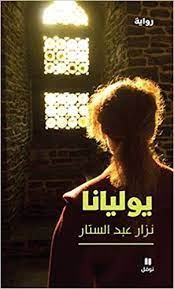
Product Description
Description يوليانا ليست امرأة تماماً، وليست قدّيسة فقط. هي مدينة. هي ضمير. هي القوة الصامتة تنطق حين يجب أن تفعل وتختار بعناية من تخاطبهم. يكفي أن تلامس قبرها، وأن تداعب طيفها، يكفي أن تكون مجنوناً قليلاً، مستبعداً كثيراً وفق نواميس البشر الضيّقة، يكفي أن تكون قلباً أبيض، حتّى تأتيك.ناحية الموصل، في دير صغيرٍ متواضع في قرية كرمليس، ترفرف روح يوليانا على المدينة. هناك، تتواصل مع مريديها، تشهد على التغيّرات التي تطرأ على البلدة البعيدة المنعزلة وهي تفتح أبوابها لرياح التحديث. يوليانا لا تحارب بسيف الدين كما يفعل الدخلاء الجدد، لا تدين التحوّلات التي جرفت أبناء البلدة نحو الملذّات ورياح الحداثة. هي الشاهدة، هي الحاضرة الغائبة، هي تلك الكتلة المشعّة التي لا تظهر كثيراً، ولكنّها، إن ظهرت، تشعل الدنيا نوراً.«يوليانا» تحاكي أسلوب الواقعيّة السحريّة من خلال قصّة مدينة صغيرة منسيّة وجيلَين من الأبناء. بين الملحميّ والدينيّ والدنيويّ، يعالج الكاتب بعين ثاقبة وقلم لمّاح ساخر مجبول بالتاريخ والأسطورة، عراق البارحة واليوم، وتحديداً المجتمع المسيحيّ فيه. Biographical note نزار عبد الستار — قاصّ وروائيّ عراقيّ وُلد في بغداد عام 1967. نالت روايته الأولى «ليلة الملاك» اهتماماً واسعاً ومُنحت عام 1999 جائزة أفضل رواية عراقيّة عن اتّحاد أدباء العراق، وجائزة الإبداع، وهي أرفع جائزة رسميّة عراقيّة. كما حقّقت مجموعته القصصيّة «رائحة السينما» رواجاً كبيراً، وأعيد طبعها أكثر من مرّة. عمل بعد عام 2003 في الصحافة، حيث أدار تحرير جريدة «المدى»، كما أسّس جريدة «تاتو» الثقافيّة.-Youliana is not quite a woman, and not just a saint. She’s a city. A conscience. She’s the silent power that speaks when she must and chooses carefully whom to address. It is just adequate to touch her grave and gratify her spirit. It’s adequate to be a little crazy, and immensely excluded in accordance with the restricted formalities of humankind. It is adequate to be kind-hearted so that she comes upon you. Outside Mosul, in a small modest monastery in the town of Karamles, Youliana's spirit flutters over the city. There, she communicates with her disciples, and witnesses the changes occurring in the remote secluded town, as she opens its doors to the wind of modernization. Youliana doesn’t fight with the sword of religion as the new outlanders do. She doesn’t condemn the transformations that drifted the townspeople towards pleasures and the winds of modernism. She is the witness. She is the absent bystander. She’s that beaming force that does not appear much but lights the world if it does. “Youliana” simulates the magical realism style through the story of an obliterated small town and two generations of children. Between the epic, the religious, and the mundane, the writer overviews Iraq’s past and present, precisely its Christian community, with a perceptive vision and a satirical expressive style coupled with a touch of history and myth.

